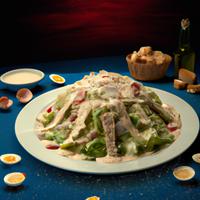
1 serving (200 grams) contains 190 calories, 8.0 grams of protein, 13.0 grams of fat, and 10.0 grams of carbohydrates.

Log this food in SnapCalorie

Nutrition Information
Calories |
223.5 | ||
|---|---|---|---|
% Daily Value* |
|||
| Total Fat | 15.3 g | 19% | |
| Saturated Fat | 3.5 g | 17% | |
| Polyunsaturated Fat | 0 g | ||
| Cholesterol | 17.6 mg | 5% | |
| Sodium | 470.6 mg | 20% | |
| Total Carbohydrates | 11.8 g | 4% | |
| Dietary Fiber | 2.4 g | 8% | |
| Sugars | 2.4 g | ||
| protein | 9.4 g | 18% | |
| Vitamin D | 0 mcg | 0% | |
| Calcium | 117.6 mg | 9% | |
| Iron | 1.8 mg | 10% | |
| Potassium | 235.3 mg | 5% | |
* Percent Daily Values are based on a 2,000 calorie diet. Your daily values may be higher or lower depending on your calorie needs.
Food Attributes
Source of Calories
About Salade cesare
Salade César, or Caesar Salad, is a classic dish originating from Mexican-American cuisine, created by Italian-American restaurateur Caesar Cardini in the 1920s. Traditionally, it features crisp romaine lettuce, crunchy croutons, and a creamy dressing made from egg yolks, lemon juice, olive oil, anchovies, garlic, Dijon mustard, and Parmesan cheese. It is often garnished with additional shaved Parmesan and occasionally protein additions like grilled chicken or shrimp. Nutritionally, the salad offers a good source of vitamins A and K from the romaine lettuce, along with healthy fats from olive oil. The Parmesan adds calcium and protein. However, the dressing can be high in calories, saturated fat, and sodium, especially in pre-made or restaurant versions. Choosing light dressing options or moderating portion sizes can make this dish a healthier choice while maintaining its rich, tangy flavor.



